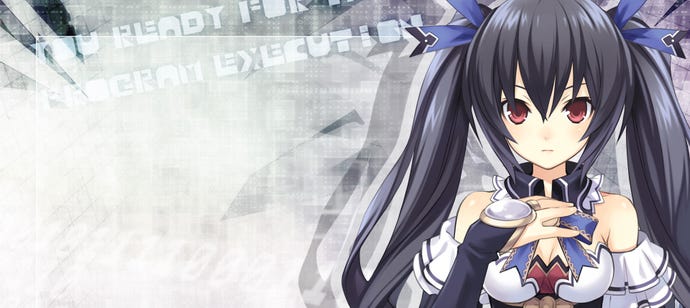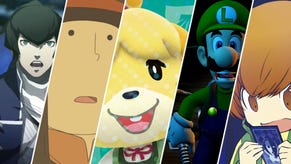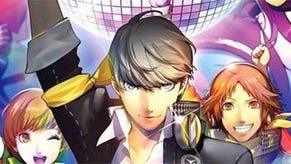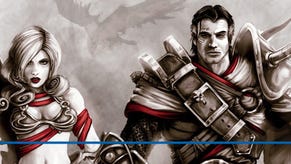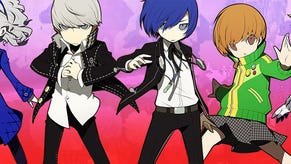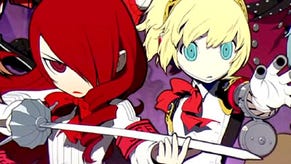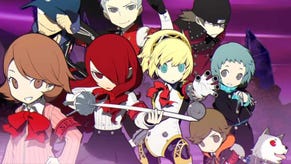JPgamer: 2014 is the Year of the Chibi Spinoff
Next year, two very different series are getting two very different games... with one very similar art style between them. Behold, chibi Persona and chibi Neptunia. Warning: extreme cuteness ahead.
This article first appeared on USgamer, a partner publication of VG247. Some content, such as this article, has been migrated to VG247 for posterity after USgamer's closure - but it has not been edited or further vetted by the VG247 team.
A lot of popular Japanese series have been chibi-fied over the years, with varying results.
In some cases, this was due to technical limitations. For example, the Final Fantasy games up until VI were hosted on platforms whose screen resolution simply wasn't sufficient to do justice to character designer Yoshitaka Amano's detailed, stylized concept art, and so we were instead given the nonetheless instantly recognizable sprites we now know and love.
At other times, it was simply a stylistic choice. Take Wild Arms on the PlayStation 1, for example; the box art and cutscenes for this game depicted the characters as realistically proportioned anime-style characters, and yet in battle they were represented as huge-headed chibi people with distinctly clunky animation. As titles like Final Fantasy VIII ably demonstrated, the PS1 was more than capable of rendering realistically proportioned, well-animated characters; Wild Arms' developer Media.Vision simply chose to make use of the stylized, cutesy art style for reasons unknown.
With the power of modern games systems -- both TV-connected and handheld -- making use of chibi characters now tends to be more of a stylistic choice than anything else, and two upcoming spinoff games make use of the distinctive aesthetic, perhaps in order to make it clear that they're not part of their more realistically proportioned source material.
The two series in question are Persona from Atlus, and Hyperdimension Neptunia from Idea Factory and Compile Heart.
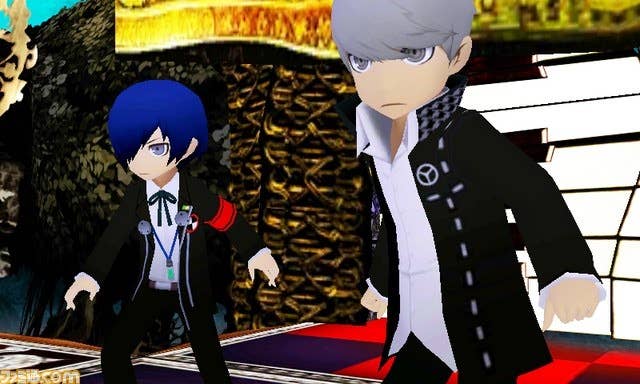
Persona Q is, as we heard recently, a Persona spinoff that takes heavy cues from another Atlus series: Etrian Odyssey. As you can see from these screenshots (courtesy of Gamer.ne.jp, via Siliconera), the game makes use of the chibi style in both its 2D and 3D artwork, and features a plot that involves both the Persona 3 and 4 casts, since Persona 4 and Arena established that these characters are contemporaries of one another.
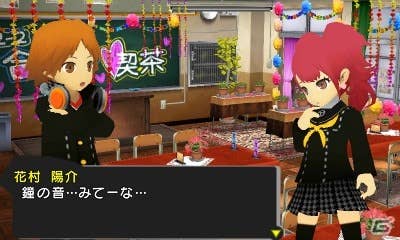
In Persona Q, you'll arrive at an alternate-universe Yasogami High -- Persona 4's school setting -- which appears to have sprouted a clock tower that wasn't there before. You'll be able to play as the protagonist from either Persona 3 or 4, and depending on your choice the story will be somewhat different. Pick Persona 3's protagonist and the characters will be sucked into the alternate dimension via that game's main dungeon Tartarus; pick Persona 4's protagonist, meanwhile, and the cast will notice that their familiar school appears to have changed somewhat.
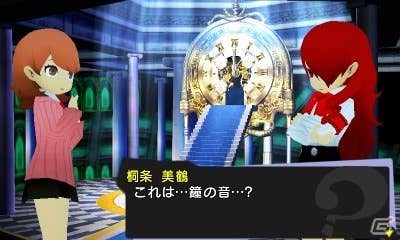
Persona Q looks as if it includes all the major cast members from both Persona 3 and 4, plus two new characters called Rei and Zen. Both of these newcomers are first-year students at Yasogami High School and have had their memories stolen. Rei is a cheerful young girl with a penchant for her seemingly limitless supply of corndogs and donuts, while Zen is the strong, silent type and seemingly a self-appointed protector to Rei.
Persona producer and director Katsura Hashino told Famitsu that Persona Q's concept came from "wanting a game that could bring further joy from an even more 'unexpected element'" than Persona 4 Arena's fighting game-cum-visual novel structure. "Persona Q will be a completely new title," he continued, "but first and foremost it'll be for the fans of the Persona series. Since next year will be the 25th anniversary of the Atlus brand, we'd like to use this opportunity to spread the essence from other titles apart from the Persona titles." Hence the crossover between Persona and Etrian Odyssey mechanics, then.
Persona Q is due out next year, though there's not yet any word on a North American release.
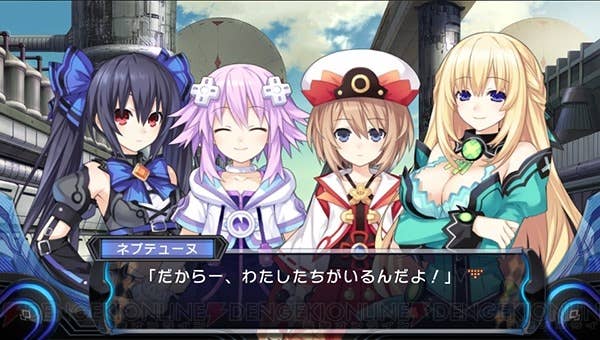
As noted above, Atlus isn't the only one taking an existing franchise, chibifying it and then tossing its characters into an unfamiliar type of game. Compile Heart's games industry-parodying Hyperdimension Neptunia series also has several new installments on the way, one of which is a Sting-developed strategy RPG starring the moefied tsundere-tastic PlayStation personification Noire, aka Black Heart.
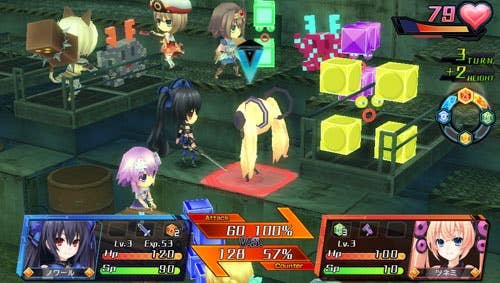
Planet Destroyer Black Heart, as the game is currently known, is a grid-based strategy RPG that features the cast of the Neptunia series, including some familiar enemies and allies, plus a variety of new characters, most of whom are, in keeping with the series, (often gender-swapped) personifications of popular video games, developers, publishers, characters and franchises. This time around, Noire is the main character instead of Neptune, and there will be 18 characters in total.
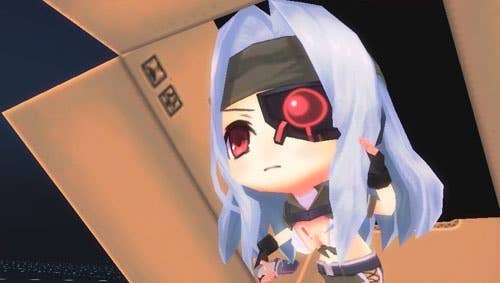
Sting is a developer known for making complex, unusual battle systems -- out of its past titles, Generations of Chaos: Pandora's Reflection combined real-time strategy, rhythm game influences and rock-paper-scissors combat, for example, while the very fact that Wikipedia describes Knights in the Nightmare as a "strategy-shooter role-playing game" should give you some indication of how the developer likes fusing different mechanics together to produce interesting, unique and complex pieces of interactive entertainment that perhaps aren't to everyones taste but are nonetheless noteworthy.
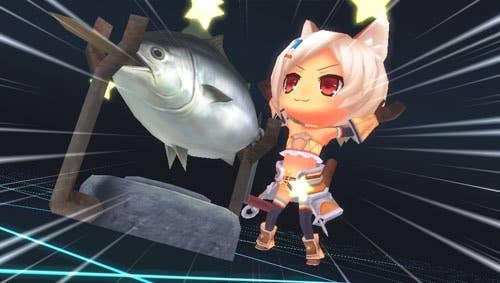
It's not known yet quite how outlandish Sting will get with Planet Destroyer Black Heart's combat system, since it's likely a significant number of players will be coming to the game due to the Neptunia characters and setting rather than Sting's pedigree and would thus probably prefer something reasonably accessible. The screenshots make it look reasonably straightforward, but it's already known that there are a number of interesting factors to bear in mind during combat, ranging from the simple (height advantage) to the abstract and peculiar (moe factor). Also, all that said, Hyperdimension Neptunia is a series that features special attacks including summoning a giant battleship with Keiji Inafune's laser-spitting face on it, smacking monsters into a microwave using an electric guitar or stamping on a stuffed toy until your enemies explode, so perhaps Sting does have a fair amount of leeway to go a bit crazy.
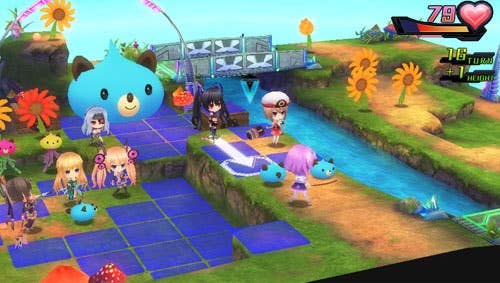
Planet Destroyer Black Heart is slated for release on Vita in Japan in May of next year. NIS America is pretty keen on the Neptunia series, so it's pretty likely we'll see a localized version of this at some point in the future.
